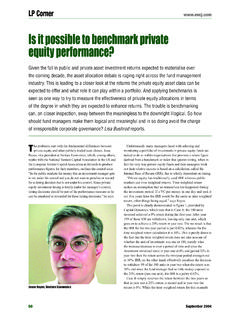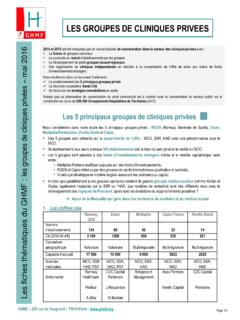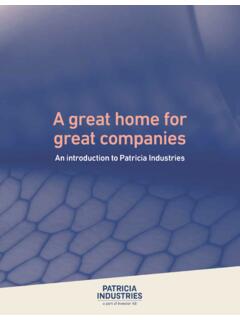Transcription of Do you invest in first time funds? - MVision
1 LP CornerThe problem with first time funds as far as institutionalinvestors are concerned is that they are inherently more risky than a proven formula. But the first time funds of today could be the stars of tomorrow, as every institutionalinvestor is too well course when you start to research the area it becomesclear that those say they will invest in first time funds are actually talking in highly qualified terms. first time funds can be very complicated in today senvironment. You need to show consistency in returns froman experienced team with a good story or be a spin-off teamthat has a track record in a popular market. Otherwise it svery hard and even more difficult in the venture area, saysMounir Guen, CEO of placement advisory firm MVision . One of the easiest and often quickest way to get a first time fund off the ground is to get a cornerstone investor onboard. This is exactly what Barlage, Knoth & Cie, a first timeGerman fund focusing on production companies in the areasof mechanical and electrical engineering and selective partsof the automotive supply industry in the German-speakingcountries, has found.
2 One of the co-founders, Rainer Knoth, was a member ofthe board of HypoVereinsbank between 1995 and 2000. It isHypoVereinsbank that has committed to the firm s first fundraising, which has 70 per cent of its 75 million targetcommitted by investors and is scheduled to close at year-end. Frank Hock at Barlage, Knoth & Cie says that of theinstitutional investors the firm approached this year duringthe course of its fund raising about 20 per cent said theywould not invest in first time funds. And the rest said they do in principle invest in first time funds, but selectively. The firm in turn was selective about which institutions itapproached. They fell into three categories: Germaninstitutional investors, fund -of-funds managers inSwitzerland, France and the UK and family offices in theGerman speaking countries. Interestingly two fund -of-fundsapproached did not say that they wouldn t invest in first timefunds specifically but that they wouldn t invest in a fund thatthey had not had a relationship with for at least three more often than not however amounts to the same said Barlage, Knoth & Cie was asked to keep in of those institutional investors that started to do duediligence with the firm but ultimately pulled out did so on thebasis that creating shareholder value and floating a companywere not the same as exiting a private equity investment.
3 Theteam at Barlage, Knoth & Cie has not worked formally togetherin the past, only on a deal-by-deal basis. Ahard proposition fortoday s tough fund raising market but the team s collective pastexperience and contacts looks set to get it off the Schwartz at Catalyst fund Management & Researchwas a private equity and venture capital investing novicewhen he set up his firm in 1997. But again as an ex-bankinganalyst of the highest calibre and for a short while an ex-investment banker he was extremely well-connected andbenefited from a frothy fund raising market in 1999. About to embark on fund raising for the firm s second fundinvesting in financial services-related businesses, the firmnow has a track record and a portfolio to display toinstitutional investors. Schwartz says raising the first fundwas easier than he expected. It was no doubt helped by hiscontacts given the number of financial institutions that cameon board with a strategic, as well as return, interest.
4 Of course in an overheated market enthusiasm is likely totriumph over experience - see table below for details of firsttime European funds raised 1999 to 2001. If 2001 looks likea depressingly sharp drop, 2002 figures are likely to be worseif the European Venture Capital & Private Equity Associationfigures for Q2 2002 fund raising are anything to go by - billion raised compared to billion in Q1 this interesting by-product of the technology bubble of the late 1990s was that first time funds, usually staff byindividuals without so much as a whiff of prior venturecapital investing, rode off the back of the excitement in thestock markets created by the venture industry returns. Theyliterally by-passed the whole tedium of the fund raising cycle and went straight to the public markets armed with an investment proposition, a few contacts and raised moneyfor investment. Mostly they were termed incubators or accelerators,catalysts and variations on the theme.
5 The London StockExchange s Alternative Investment Market was guilty ofspawning several such companies, many of which have since imploded, merged or been reversed into due to theircash piles. The cash piles were in many cases money fromthe original placing that was never spent and ludicrously, post crash in 2000, some of these former stock marketdarlings were sitting on cash of say 20 million and being valued at just 15 million. This absolutely reflectedinvestors confidence in what these groups would end up investing. you invest in first time funds? Lisa Bushrod reports first time funds can be verycomplicated in today s environment LP CornerReturning to the selectivity of institutional investors thatHock refers to. This amounts to sub-dividing first time fundsinto distinct categories. Firstly there are first time funds withno track record (Barlage, Knoth & Cie). Secondly, there arespin-offs from existing teams and so they come with a trackrecord.
6 Finally there are teams with a new strategy or whoare adding a new component such as deal size, geography,or sector to an investing formula they have proven already. The prospects for getting the first type off the ground in the current market are not fantastic. The second has spawnedsuch teams as Penta Capital (ex Royal Bank DevelopmentCapital) and Alchemy Partners (John Moulton is both ex-Apax Partners and ex-Schroder Ventures.) The Penta team leftRoyal Bank Development Capital on the strength of Bank ofScotland s willingness to cornerstone their new venture. JohnMoulton, having already built a considerable reputation forhimself, so the stories go, had institutions banging on his doorarmed with commitments in the order of 600 million just onthe basis of the announcement that he was going it alone. That said the mix must be right. The four ex-Royal Bank Development Capital guys who finally got Penta offthe ground were a well-rounded and complementary Moulton, despite his industry figure status, was alsosupported by a strong enough team for investors not to worry about what would happen to their money if hesuddenly disappeared from the time funds will continue to get a slice of theinstitutional investment pie, even if things are tough going forthe next couple of years in terms of fund raising, particularlyin the venture area.
7 The fact is that one of the many thingsinstitutional investors have learned during the latest cycle isthat there is not always a very good correlation between brandname and performance. Consequently helping get first timefunds off the ground is always going to hold its attractions andgiven the financial commitment required during the fundraising process (one first time fund estimated the costs ran upby a four man team during the fund raising process got closeto 2 million in total) only the serious need apply. evcj time European fundsYearTotal numberTotal $ buyout2 development2 generalist2 early 1 later1 3 buyout3 development1 balanced1 generalist 1 buyout 1 later1 buyout4 balanced 2 fund -of-funds2 development1 early1 4 buyout1 generalist2 early1 fund -of-funds4 development2 balanced buyout4 development2 early1 balanced1996112, balanced5 early2 buyout1 development1997294, early8 buyout 4 fund -of-funds2 balanced2 development1 generalist1 seed1998422, fund -of-funds16 early6 buyout5 balanced8 development1 generalist1999474, early2 later3 buyout10 balanced10 development2 generalist1 expansion1 fund -of-funds1 real estate2000434, early5 buyout1 later6 development6 balanced2 fund -of-funds2 expansion2001131.
8 Early2 development1 later2 seed1 balanced,1 fund -of-funds1 turnaroundFrom 1993 fund vintage determined by year of first investment, no matter how smallSource: Venture EconomicsPlease contact Katja Wuchterl onTEL: +44 020 7369 7545 FAX: +44 020 7369 xxxxemail: you would like reprints








